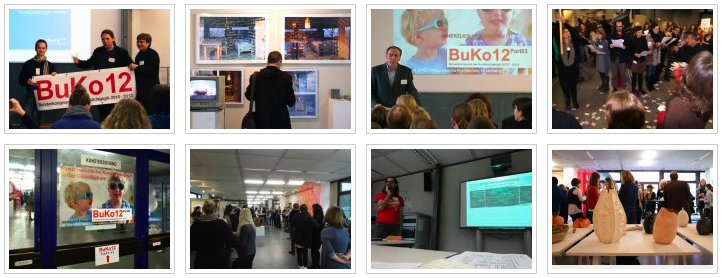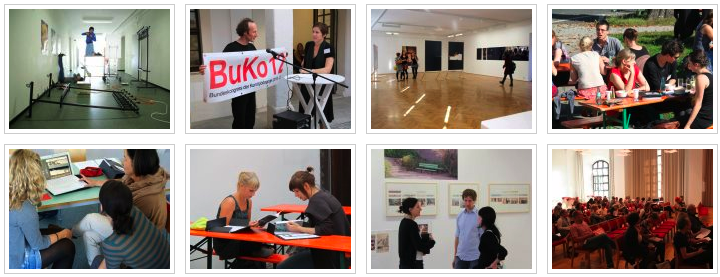Preconferences Part01–08
Posted: 29.05.2012
Part01 – How much art does art education need?
Frankfurt, November 2012. BuKo12 is launched with the panel discussion Part01 “How much art does art education need?” at the Frankfurter Kunstverein. The event is held in cooperation with the Kunsthochschule Kassel and the BDK Hessen. In view of the discussion of the reformulation of the education standards of the state of Hesse, the issue is addressed with regard to the question if what can be learned and experienced through art does still meet the demands of an orientation for adolescents for present and future areas of life. Program (in German)

Part02 – Expeditions in Aesthetic Education
Hamburg/Dortmund/nationwide, April 2011 through Summer 2012. Led by the Universität Hamburg and the TU Dortmund University, the exchange between teaching staff and the communication of practical knowledge through study visits to various places of education was initiated in order to bring into focus the collegial discourse on problems of and the conditions for successful outcomes of art communication and art education on site. Program (in German)

Part03 – Participatory Art Education at Elementary Schools
Kassel/Heidelberg, May 2011 through January 2012. The discussion and testing of substantive and art related teaching models for the development of participatory art didactics at elementary schools is the subject of a conference at the University of Kassel as well as of teaching trials and a presentation of the results at the Heidelberg University of Education. Program (in German)

Part04 – Hedo-Camp meets Global Art at ZKM
Flensburg/Mainz/Karlsruhe, January 2012. Led by the Universities of Flensburg and Mainz and in cooperation with ZKM | Karlsruhe, the event discusses the question if having fun is suspicious. The event “Hedo Camp meets Global Art” in Karlsruhe offers the opportunity to combine the fields of media/art/education with hedonistic aspects of emotions such as joy, delight, and pleasure or pain, stress, and listlessness. The exhibition on global contemporary art, “The Global Contemporary. Art Worlds After 1989”, will become a terrain for exploration during the two-day research camp. Program (in German)

Part05 – Art Education in the Context of All Day Education and Social Space Orientation
Erfurt, November 2011. A conference at the University of Erfurt opens an information and exchange forum on the current aspects of all day education as both an opportunity and a challenge for art educational practice. A key subject is the development of education landscapes through the collaboration of partners from the fields of formal and of non-formal education as well as its benefits for the development of a social space-oriented art education. Program (in German)

Part06 – Art and Current Media Culture at School
Dresden, October 2011. To conclude the stipend program “kiss – Kultur in Schule und Studium” [Culture in Schools and Universities] (2008-2010), an expert conference at the TU Dresden and the Kunsthaus Dresden discusses the currently controversial issue of the significance of contemporary art and media culture in art education at school. Program (in German)

Part07 – ArtEduCamp
Cologne, December 2011. A BarCamp-like event on the subject of art education at the University of Cologne offers an open conference format with a flat hierarchy where especially young pedagogues – students, trainee teachers, and junior researchers – can voice their questions and visions and talk about their cultural horizons. Program (in German)

Part08 – Interculture. Art Education remixed
Nuremberg/Erlangen/Dortmund, April 2012. Classrooms become more colorful, heterogeneous, varied. Old methods and curricula are not effective anymore or only to a limited extent. Global shifts in the arts and the cultural sector also change the frame of reference. Art communication and art education have to redefine their positions. The conference on remixing in art, visual culture and spheres of life examines how learning opportunities in the sphere of the visual can be expanded, preserved and enriched for all children and adolescents, how aesthetic processes of identity development in a society of immigration can be initiated and how the potential of migration can be used in art education. Program (in German)

 English
English Deutsch
Deutsch 



